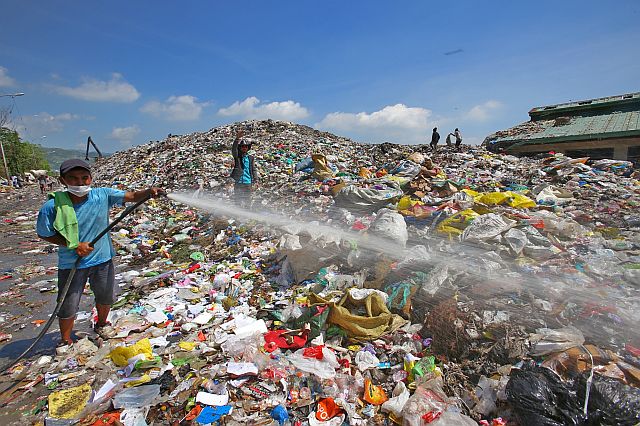Landfill finally gets a dose of enzymes

Personnel of the Department of Public Services (DPS) start a massive spraying of enzymes at the Inayawan Landfill to lessen, if not totally eliminate, the smell from the mountains of garbage (CDN PHOTO/JUNJIE MENDOZA).
Expect Cebu City’s sanitary landfill in Barangay Inayawan to stink less in the coming days.
After the purchase of P400 thousand worth of deodorizers using the city’s Accelerated Social Amelioration Program (ASAP) funds, bigger amounts of enzymes are finally being sprayed on the garbage to further mitigate the stench coming from the facility.
“Medyo dako gyud ang cost. Pero nakita nato nga effective gyud siya sa baho kay mao man gyud ni ang outcry sa mga tao. Pero sa sugod ra ni. Kadugayan, mas mobarato na ato gasto (It’s a bit expensive but we have really seen that it’s effective against the stench which is really the outcry of the people. But this will only be at first. Later on, we will be using lesser enzymes and spending lesser money), ” Department of Public Services (DPS) chief Roberto Cabarrubias told reporters in a press conference at the landfill facility yesterday.
Cabarrubias explained that a total of 333 packs of enzymes were bought using the amount.
Each pack is dissolved in 200 liters of water and is left to ferment for six to 12 hours before the solution is sprayed on fresh garbage dumped into the landfill.
Cabarrubias explained that before the enzymes are sprayed, the piles of garbage must also be sprayed with water since the bacteria works better in a wet environment.
DPS began spraying last Wednesday.
The enzymes are expected to mitigate the strong stench for around 15 days; after which, another spraying session will be conducted, said Cabarrubias.
The enzymes were first introduced last month by CHC Agritech in a demonstration made at the landfill.
Joel Rafer, CHC Agritech product consultant and developer, said that they’ve been promoting the product in landfills, waste water management systems and even in poultry farms and piggeries all over the country.
“These are beneficial microbes that are fully cultured. It’s not just one bacteria. It will serve as rapid odor eliminator and a disinfectant at the same time. Although it can’t completely eradicate the flies here, it can lessen it. It also acts as a rapid decomposer,” he said.
The bacteria are organic and won’t cause any harm to the environment, Rafer added.
Rafer recalled that he first learned about the odor problem at the Inayawan dumpsite while reading the newspapers in a hotel he was staying at in Cebu last month.
The problem prompted him to try and introduce their product, he said.
Junjun Tumulak, 37, a scavenger inside the landfill, said he noticed the difference in the smell after the city started to spray enzymes to the garbage.
“Para namo, dili naman mi mabahoan kay naanad na mi. Pero naay usahay nga kung padung diri ang hangin, grabe gyud ang baho. Pero karon, nakabantay ko nga nigamay gyud ang baho. Effective gyud siya (For us, we don’t mind the odor since we’re already used to it. But there are times, when the wind goes in our direction, the smell is really bad. But now, I’ve noticed that the smell has weakened. I think it’s really effective)” said Tumulak who started scavenging when he was seven years old.
Cabarrubias said that after their first emergency purchase, DPS will assess the effect of the enzymes before asking for an additional purchase using other sources of funds.
He said the DPS has savings of more than P1 million which might possibly be used.
Cabarrubias also said that DPS has been using only one side of the landfill, near the entrance, to dump the newly collected garbage as it was difficult for trucks to access the inner part without a proper road network going there.
DPS has been using garden soil donated by some contractors to form a road leading to the inner part of the landfill.
But with recent rains, the road has become muddy and difficult for trucks to pass through.
Cabarrubias said if the council approves the DPS request for anapog, it would be less difficult for the trucks to pass since anapog or limestone is porous and becomes compact when wet.
The center of the landfill remains underutilized, he explained.
Disclaimer: The comments uploaded on this site do not necessarily represent or reflect the views of management and owner of Cebudailynews. We reserve the right to exclude comments that we deem to be inconsistent with our editorial standards.




